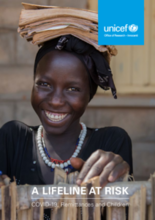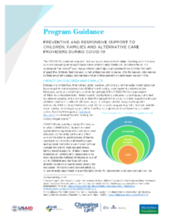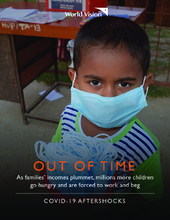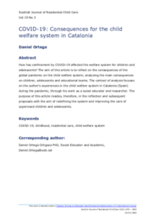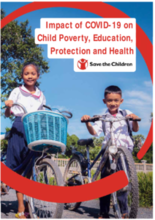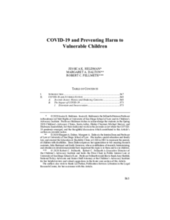This section includes resources on the response to the COVID-19 pandemic as it relates to child protection and children's care.
News on COVID-19 and Children's Care
Webinars and Events on COVID-19 Response
Displaying 641 - 650 of 756
The Child Protection Learning Brief Series aims to extract, synthesise and analyse learning on child protection risks and programme adaptation in the COVID-19 pandemic, contributing to improving policy, advocacy and programme results during infectious disease outbreaks.
This briefing paper outlines the potential risks of reduction in remittances due to the pandemic for children in households receiving remittances and what can be done to minimize these risks.
This page includes the official IFSW statements relating to the Covid-19 Virus and IFSW member updates and reports.
This brief from Changing the Way We Care uses an ecological framework to help illustrate how the COVID-19 crisis might impact the children, families and communities and how to help programs adapt, reorganize and prioritize prevention and response activities.
On this webpage, UNICEF answers some common questions that parents may have about the novel coronavirus, including how to talk about the coronavirus with children.
This webpage features a selection of materials which the Coalition for Children Affected by AIDS have found to be useful.
World Vision has conducted rapid assessments in 24 countries across Latin America, Sub-Saharan Africa, and Asia confirming alarming predictions of increased child hunger, violence, and poverty due to the economic impact of COVID-19.
The aim of this article is to reflect on the consequences of the global pandemic on the child welfare system, analysing the main consequences on children, adolescents and educational teams. The context of analysis focuses on the author's experiences in the child welfare system in Catalonia (Spain) during the pandemic, through his work as a social educator and researcher.
This report presents findings from a survey undertaken in Cambodia, between June and July 2020 to generate evidence on how the COVID-19 pandemic and subsequent mitigation measures are affecting children's health, nutrition, education and learning, protection and wellbeing, family incomes and jobs, and poverty.
This article explores the current state of child rights within the U.S. child welfare, juvenile justice, and special education systems, highlighting concerns that pre-date COVID-19 as well as recent legal implications of the pandemic.

